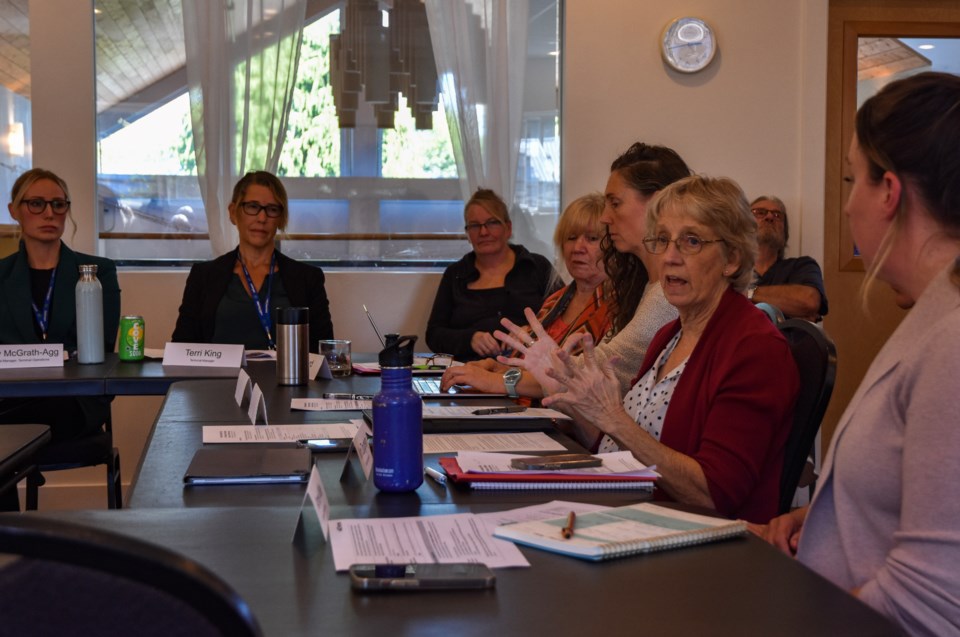Following a verbal outburst from a member of the public during a Southern Sunshine Coast Ferry Advisory Committee (FAC) meeting in Gibsons last September, BC Ferries announced that future meetings would be postponed, and its public consultation sessions would be moved online. Five months later, in-person meetings are still suspended.
Southern Sunshine Coast FAC chair Diana Mumford says that since the incident, the committee has been “continually ignored” while they try to discuss a plan forward.
Mumford says the timeline to resume in-person meetings has been constantly changed by BC Ferries. The corporation originally said the meetings would resume at the end of October, then said it would be the beginning of 2024, and most recently have estimated that early spring is when in-person meetings may resume.
More than 40 people attended the tension-filled FAC meeting in Gibsons in September, as it followed the over two months. A Sunshine Coast community member said that they were a resident of 20 years who blamed “a lot of the problems” on reservations. They said they would “take a gun” to BC Ferries if they increased the number of reservation spots above 50 per cent.
Following the meeting, BC Ferries vice-president of strategy and community engagement, Brian Anderson, sent a letter to the FAC chairs suspending in-person events while it implemented a safety and security plan for community engagement activities.
At the time, Anderson said that team members had noted a rise in “aggressive, threatening and abusive behaviour,” in recent months. He said that BC Ferries intended to meet with chairs of advisory committees to look for ways to create a peaceful setting during meetings. “It our goal is to resume face-to-face meetings as soon as possible as guided by the safety plan.”
The RCMP and sa国际传媒 Ferries security personnel were looking into the situation on the Sunshine Coast, Anderson also said.
Mumford said that the individual who issued the verbal threat had apologized to BC Ferries shortly after the incident, and promised not to attend any meeting in the future, asking them not to blame the FAC for what they said.
“It's like we've all got class detention. All of the FACs are being punished by one incident that happened at our meeting,” Mumford said. “I don't know that that's fair, some [FACs] don't get more than two or three people at their meetings.”
In a statement to Coast Reporter received Feb. 21, Deborah Marshall, BC Ferries’ executive director of public affairs, said that following the Sunshine Coast incident, it became aware that aggressive and abusive behaviour had been taking place at several community events but was going unreported.
“The security review concluded that, without changes, we would be at risk of non-compliance with several WorkSafeBC regulations as well as some of our own internal policies to ensure a safe workplace for our people," she wrote.
In an earlier statement to Coast Reporter, Jeff Groot, executive director of communications and engagement said, “Keeping our people safe is non-negotiable and we have to get that right. As we looked into this instance, it raised a number of areas where we had out of date policies and processes that didn’t serve to deliver the safe environment we want for anyone – including members of the public – who attend these kinds of events."
Groot said that they are working to develop new processes for the organization to be more responsive to feedback. “Having in-person engagement and discussions is really important to improving our relationship with communities and we want to get it right.”
Coast concerns remain unaddressed
A concern for Mumford is BC Ferries effectively hearing concerns from Coasters. Mumford says without these in-person meetings, the opportunity for community engagement has simply disappeared.
Mumford raised this past Family Day weekend where a medical issue on the Nanaimo-Horseshoe Bay route led to the on Feb. 17, as a further example of BC Ferries' tumultuous relationship with the Sunshine Coast. She also cited that BC Ferries' latest quarter report had 59 per cent on-time performance for the Sunshine Coast route.
Mumford said she did a survey of other FAC chairs to see how long they had been living in their respective communities, highlighting the key insight locals can provide. She said that the least she saw from anybody was 10 years and that one chair had been in their community for 60 years.
Some FAC chairs are so discouraged that they have talked about quitting and starting a completely separate group, saying they are tired of the “royal runaround,” said Mumford.
“We bring a lot of knowledge and expertise about the flavour of our communities,” she said. “More so than they're going to get in the atrium in Victoria.”
Jordan Copp is the Coast Reporter’s civic and Indigenous affairs reporter. This reporting beat is made possible by the .
– With files from Carla Wilson, sa国际传媒

